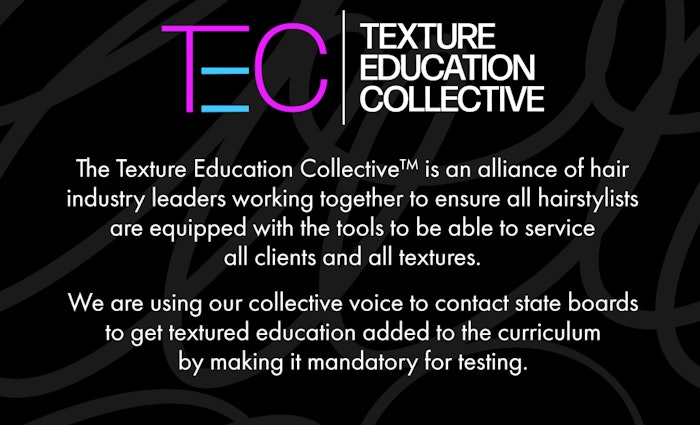
The Professional Beauty Association (PBA), the largest and most inclusive national trade organization representing the professional beauty industry, has announced the Texture Education Collective (TEC), an alliance of professional hair industry leaders with a shared goal of encouraging cosmetology state board licensing requirements and curriculums nationwide to be inclusive of all hair types and textures.
An estimated 65% of the US population have curly, coily or wavy hair, according to a 2018 Texture Trends Report from NaturallyCurly, yet many salon clients with textured hair report not having equitable access to professionally trained, licensed stylists with the skill set and experience to provide services for their hair type. According to the Models of Color Matter Diversity on the Runway Study (2019), 66% of high-fashion BIPOC models have experienced a stylist who was unable to cater to their hair texture.
To develop more inclusive salon environments, with experienced licensed beauty professionals that have been educated in textured hair, the Texture Education Collective encourages states to adopt textured hair education as part of their curriculum and state board exams. The goal is to empower cosmetologists and stylists with the confidence to consult and work with clients who have textured hair, while maintaining the styling performance, health and safety standards they learn in their cosmetology programs.
The mission of the Texture Education Collective is twofold:
- To ensure all hairstylists are equipped with the education, skills and tools to be able to service all clients and all hair types and textures.
- To pave the way for all consumers to feel welcomed, valued, understood, and seen when getting serviced by hairstylists while upholding the highest standards in health and safety.
Equipping cosmetology students with an education that is inclusive of textured hair types allows for their reach to be even more impactful. There is industry-wide demand for such action, with 75% of stylists reporting wanting more training in how to work with textured, coily and/or kinky hair (TRESemme Hair Bias Study/2019).
Since forming the group with founding partners Aveda, DevaCurl, L’Oréal USA and Neill, the Professional Beauty Association has worked diligently to broaden awareness and acceptance of the Texture Education Collective’s mission. This includes consistent outreach to state boards, the development and sharing of information, and ongoing research to remain at the forefront of the issue.
“Through a collaborative effort, we are all working together with outreach, education and ongoing conversations with state boards of cosmetology and barbering across the states,” shares PBA Executive Director, Nina Daily.
“For too long, the care of textured hair has been left out of the required training programs for hairstylists,” shares Erica Roberson, DE&I Business Development, L’Oréal Professional Products Division. “As the leaders of the beauty industry, L’Oréal believes we must be a driver of this change for more inclusivity. Through our Textured Mastery program, L’Oréal’s Professional Products Division has made significant strides in including all hair types in the education offerings we provide hairstylists and cosmetology school students across our professional hair brands – Redken, Matrix, Mizani, Kérastase, L’Oréal Professionnel, Pureology, Biolage Professional, Shu Uemura, Pulp Riot and SalonCentric. As a founding member of the Texture Education Collective, we will be a strong voice advocating for an update to the educational requirements for cosmetology licenses and we will contribute our educational resources and expertise to support the inclusion of all hair textures in the curriculum.”
“Through the lens of DEI this is the type of industry provoking change that you hope to see accomplished,” shares Alicia Williams, Senior Director of Anti-Racism & Racial Equity at DevaCurl. “DevaCurl being a founding member of the Texture Education Collective makes me proud both personally and professionally. Leading meaningful change in an industry that impacts everyone is the cornerstone of inclusivity."
Rosa Ajjam, Senior Vice President & GM of Aveda North America, said, “Recognizing and including education on textured hair in state board exams solidifies the commitment of Aveda and the salon industry to furthering inclusivity and empowering hair professionals with the knowledge and skills needed to serve all clients of all hair types with confidence.”
In November of 2021, Louisiana became the first state to officially require textured hair training for all cosmetologists, paving the way for nationwide action. Mr. Edwin Neill, III, owner of Neill Corp, parent company of Aveda Arts & Sciences Institutes, and a TEC member, is the Chairman of the Louisiana Board of Cosmetology and successfully accomplished this change in the state.
“In Louisiana, we received great excitement from the industry. We added a texture cutting section to the practical exam and salons are continuing to push this important advancement work locally. I’m excited to take this work to other states through support of the TEC,” said Edwin Neill.
Founding members of the Texture Education Collective include Aveda, DevaCurl, L’Oréal USA, and Neill. Supporting partners include Avalon, BBR, Bumble and bumble, Evie Johnson, L’ANZA, Living Proof, Milady, Sam Villa and Texture vs. Race.
The Professional Beauty Association, in partnership with the Texture Education Collective, urges supporters to sign the petition on the TEC website to include textured hair in cosmetology testing standards.
For more information on the Professional Beauty Association or to become a supporting member visit probeauty.org.












